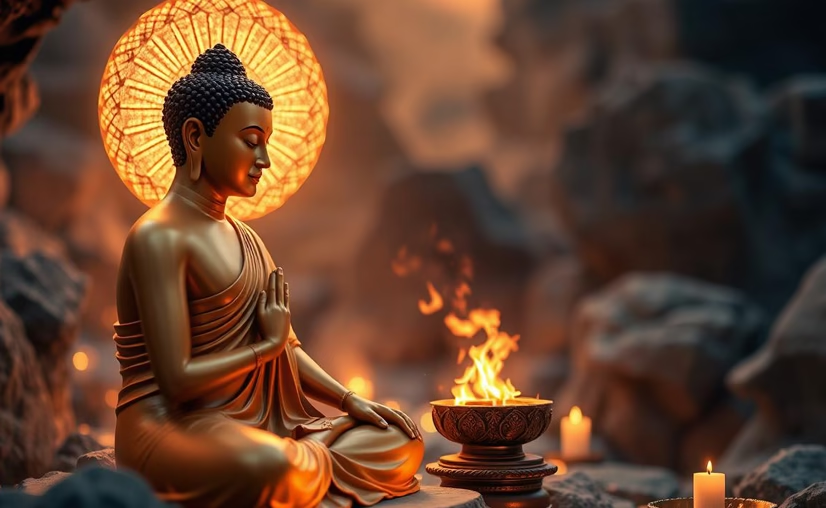Karma and Rebirth: The Buddhist Perspective

Karma and Rebirth: The Buddhist Perspective
The Buddhist teachings on karma and rebirth clarify life’s moral consequences while leading practitioners toward liberation from existence by promoting wisdom and compassion.
Since Gautama Buddha taught them in the 5th century BCE, karma and rebirth remain central elements of Buddhist philosophy and provide significant insight into life’s ethical patterns and the ongoing cycle of existence. The teachings from the Pali Canon highlight wisdom and compassion along with ethical behavior as means to attain liberation. Through my study of Buddhist philosophy I find the principles of karma and rebirth promote conscious living and personal responsibility across both historical and modern societies.
Karma: The Law of Cause and Effect
Karma, derived from the Sanskrit word for “action,” refers to the principle of moral causation: Every intentional action generates corresponding outcomes through thoughts, words, and deeds. The mind creates all phenomena because it precedes them according to the Dhammapada and ethical actions give rise to positive results while unethical actions lead to suffering. A Journal of Buddhist Ethics study published in 2020 highlights how karma functions as a mechanism for developing ethical responsibility.
Types of Karma
- Wholesome (Kusala): Kind actions based on compassion and generosity and wise decision-making result in happiness.
- Unwholesome (Akusala): Actions motivated by greed and hatred or driven by ignorance result in suffering.
- Neutral: Routine tasks and similar actions do not carry any moral significance.
How Karma Operates
- Intentionality: Only deliberate actions generate karma.
- Ripening: Karmic effects can emerge during this lifetime or in future lives through rebirth.
- Accumulation: The conditions of the present moment stem from past karma yet present actions dictate future outcomes.
Rebirth: The Cycle of Existence
The perpetual process of samsara or rebirth involves cycles of birth and death which continue due to the workings of karma. Buddhism teaches that consciousness flows through existence and is constructed by five aggregates which carry karmic imprints from life to life. The Milindapanha compares rebirth to the transfer of flame between candles which remain separate but linked. A study published in the Buddhist Studies Review in 2021 identifies how rebirth functions as a motivation for moral conduct.
Realms of Rebirth
- Human: Offers optimal conditions for spiritual growth.
- Deva (Gods): Pleasure-filled but impermanent realms.
- Asura (Demi-gods): Marked by jealousy and conflict.
- Animal: Driven by instinct, with limited agency.
- Preta (Hungry Ghosts): Tormented by unfulfilled desires.
- Hell: Intense suffering due to harmful karma.
Karma, Rebirth, and the Path to Liberation
The Four Noble Truths encompass the principles of karma and rebirth: Suffering (dukkha) emerges from one’s craving and negative karma which sustains the cycle of samsara. Through adherence to the Eightfold Path one attains nirvana by eliminating craving which breaks the cycle of rebirth. The Samyutta Nikaya teaches that following ethical actions connects with the path which leads to liberation.
Path to Liberation
- Ethical Conduct: The practice of the Five Precepts leads to the creation of positive karma.
- Meditation: Cultivate mindfulness to purify the mind.
- Wisdom: Understand karma and rebirth to transcend samsara.
Read further about Buddha’s philosophy through our detailed article on The Four Truths.
Practical Implications for Daily Life
Knowledge of karma and rebirth leads to a lifestyle filled with mindfulness and compassion. When individuals become aware of the outcomes of their actions they choose to behave ethically and demonstrate kindness. According to a 2021 study published in the Mindfulness journal, mindfulness practices based on karma principles help decrease stress and improve empathy which supports current psychological methods.
Practical Applications
- Mindful Actions: Pause to consider intentions before acting.
- Compassionate Choices: Practice generosity to cultivate positive karma.
- Reflection: Review past behaviors during meditation as a path to personal growth.
Why Karma and Rebirth Matter Today
The teachings of karma and rebirth provide an ethical structure to understand life’s challenges which remain significant for 520 million Buddhists across the world according to Pew Research Center’s 2020 data. The focus on personal responsibility matches current ethical challenges in society and mindfulness exercises based on these values foster mental well-being according to a 2021 study on Mindfulness.
Ways to Engage
- Meditate: Through Vipassana meditation practitioners learn to monitor their mental intentions utilizing the instructions from the Satipatthana Sutta.
- Study Texts: Read the Dhammapada at Access to Insight.
- Practice Ethics: Apply the Five Precepts in daily interactions.
- Join Communities: Discuss karma in sanghas or online forums.
FAQ: Karma and Rebirth in Buddhism
- Q: What is karma in the Buddhist perspective?
- A: The principle of karma represents a moral law of cause and effect which dictates that intentional actions bring about matching results that determine future experiences.
- Q: How does rebirth work in Buddhism?
- A: In Buddhism, rebirth manifests as the samsara cycle where karma directs the continuous flow of consciousness through multiple lifetimes in the absence of an enduring self.
- Q: How do karma and rebirth relate to liberation?
- A: By following wholesome karma and the Eightfold Path practitioners overcome craving which stops the rebirth cycle and brings about nirvana which represents ultimate peace.
- Q: Why are karma and rebirth important in contemporary society?
- A: Living ethically and being mindful helps build compassion and resilience which assists people in tackling both personal and social difficulties.
- Q: What are some resources to understand the concepts of karma and rebirth better?
- A: Find related texts online at Access to Insight or the Buddhist Digital Resource Center.
Conclusion: Living with Wisdom and Compassion
The Buddhist concepts of karma and rebirth reveal life’s moral framework while directing practitioners to achieve wisdom and compassion that lead to liberation. These principles inspire ethical living and peace. Join the conversation about karma and rebirth in the comments or subscribe for additional Buddhist philosophy insights!